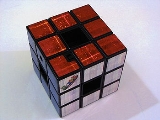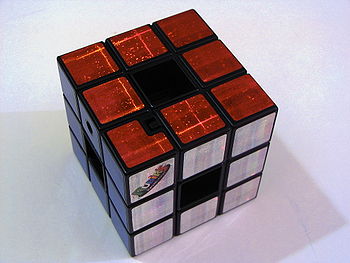
Rubik's Revolution
Encyclopedia
The Rubik's Revolution is a handheld electronic game
distributed by Techno Source
. Designed to resemble the classic Rubik's Cube
puzzle, the device is a single rigid cube; it is about as large as a Professor's Cube
, with each face subdivided into 9 square sub-faces. The center square of each face features a recessed LED
-lit button colored to correspond with the stickers on the remaining squares. Gameplay involves pressing the buttons when they light up, or when directed to by the game's recorded voice.
This gameplay is completely different from that of the Rubik's Cube
, despite the physical resemblance to the Rubik's Cube's solved state. There are no separate, movable sub-cubes as in the Rubik's Cube; the 6 faces are of uniform, unchanging color, and the 9 facets on each face are fixed in place.
 The Rubik's Revolution 15 includes 6 electronic games, using the 6 lighted buttons in the recessed squares at the center of each face of the cube and the internal speaker. These games are called "Light Speed", "Rapid Recharge", "Pattern Panic", "Cube Catcher", "Code Cracker", and "Multiplayer Madness". There is also a Titanium Edition, a Micro Edition and an Ice Edition. The Titanium comes equipped with a memory system that keeps track of your score. The Micro Edition is a "keychain" style cube that only allows you to play a shorter version of Light Speed. Like the Titanium Edition, the Ice Edition keeps track of your score but also tracks your progress.
The Rubik's Revolution 15 includes 6 electronic games, using the 6 lighted buttons in the recessed squares at the center of each face of the cube and the internal speaker. These games are called "Light Speed", "Rapid Recharge", "Pattern Panic", "Cube Catcher", "Code Cracker", and "Multiplayer Madness". There is also a Titanium Edition, a Micro Edition and an Ice Edition. The Titanium comes equipped with a memory system that keeps track of your score. The Micro Edition is a "keychain" style cube that only allows you to play a shorter version of Light Speed. Like the Titanium Edition, the Ice Edition keeps track of your score but also tracks your progress.
An electronic voice
is used to guide the players both during game play and for configuration, such as
changing the volume.
The games also employ various other sound effects, such as a soft "click" sound when a button is pressed.
The game ends if the player presses the wrong button or runs out of time, or beats the game.
Handheld electronic game
----Handheld electronic games are very small, portable devices for playing interactive electronic games, often miniaturized versions of video games. The controls, display and speakers are all part of a single unit. Rather than a general-purpose screen made up of a grid of small pixels, they...
distributed by Techno Source
Techno Source
Techno Source concentrates primarily in the handheld electronic game and TV Game markets selling electronic toys, games and learning aids.Based in Hong Kong with United States offices in New York City, Techno Source is a privately owned company founded in 2000 by two toy industry veterans, Wayne...
. Designed to resemble the classic Rubik's Cube
Rubik's Cube
Rubik's Cube is a 3-D mechanical puzzle invented in 1974 by Hungarian sculptor and professor of architecture Ernő Rubik.Originally called the "Magic Cube", the puzzle was licensed by Rubik to be sold by Ideal Toy Corp. in 1980 and won the German Game of the Year special award for Best Puzzle that...
puzzle, the device is a single rigid cube; it is about as large as a Professor's Cube
Professor's Cube
The Professor's Cube is a mechanical puzzle, a 5×5×5 version of the Rubik's Cube. It has qualities in common with both the original 3×3×3 Rubik's Cube and the 4×4×4 Rubik's Revenge, and knowing the solution to either can help when working on the 5×5×5 cube....
, with each face subdivided into 9 square sub-faces. The center square of each face features a recessed LED
LEd
LEd is a TeX/LaTeX editing software working under Microsoft Windows. It is a freeware product....
-lit button colored to correspond with the stickers on the remaining squares. Gameplay involves pressing the buttons when they light up, or when directed to by the game's recorded voice.
This gameplay is completely different from that of the Rubik's Cube
Rubik's Cube
Rubik's Cube is a 3-D mechanical puzzle invented in 1974 by Hungarian sculptor and professor of architecture Ernő Rubik.Originally called the "Magic Cube", the puzzle was licensed by Rubik to be sold by Ideal Toy Corp. in 1980 and won the German Game of the Year special award for Best Puzzle that...
, despite the physical resemblance to the Rubik's Cube's solved state. There are no separate, movable sub-cubes as in the Rubik's Cube; the 6 faces are of uniform, unchanging color, and the 9 facets on each face are fixed in place.
Features

An electronic voice
Speech synthesis
Speech synthesis is the artificial production of human speech. A computer system used for this purpose is called a speech synthesizer, and can be implemented in software or hardware...
is used to guide the players both during game play and for configuration, such as
changing the volume.
The games also employ various other sound effects, such as a soft "click" sound when a button is pressed.
Light Speed
One button will light up, and the player has a certain amount of time to press the correct button. As the player makes progress, the player has less time to press the correct button. The game ends if the player presses the wrong button, runs out of time, or beats the game with the maximum score of 999 (20 minutes). The Titanium version of Light Speed allows you to score over 2,384 points (over an hour's worth of game play). the Ice Edition allows you to score over 9,999 points (that's 7,615 more points than the Titanium Edition). Unlike the original, Titanium and the Ice, the Micro Edition has a ranking system for how well a person plays. Micro Edition ends when the player presses the wrong button, runs out of time, or reaches the maximum score of 99.Rapid Recharge
Buttons will randomly light up for a short period of time. When a button has been lit for a certain amount of time, it will start flashing and a warning alarm will sound. The player must rapidly press that button to "recharge" it. The player wins if they can simultaneously charge every button. The game ends if the player fails to recharge any of the buttons in time, or beats the game .Pattern Panic
A sequence of buttons light up and their colors are spoken, starting with one button on the first round, two on the next, et cetera. The player has five seconds to correctly press the same sequence of buttons.The game ends if the player presses the wrong button or runs out of time, or beats the game.

